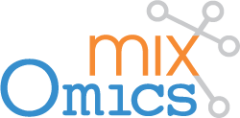Single and multi-omics analysis and integration with mixOmics
Our registrations are now closed! Fill in this Expression Of Interest for if you missed out, so that we can notify you of new workshops.
This course is designed for:
- Beginners looking for an introduction to mixOmics methods for single- and multi-omics analyses.
- Current mixOmics users who want to deepen their understanding of the mixOmics methods.
- Users who would like more guidance on analyzing their own data (we also provide exemplar datasets).
The workshop is self-paced and spans across 7 weeks. There are 4 Q&A live sessions, and many opportunities to interact with the cohort and your instructor Prof Kim-Anh Lê Cao via Slack. BYO data is encouraged: we provide advice so that you can analyse your own data with mixOmics tools as part of your learning process. A good working knowledge in R programming (e.g. handling data frame, perform simple calculations and display simple graphical outputs) is essential to fully benefit from the course*.
According to our past participants, a time commitment of 5-8h/week was sufficient to feel that they were progressing. Here is some feedback from a previous course.
We provide a certificate of attendance or completion.
Register here, places are limited!
Fees
Research Higher Degree students enrolled at a University: $495 AUD (incl. GST) [discount code: MIXO_RHD]
Staff and members from Universities & Not-for-profit organisations: $825 (incl. GST) [discount code: MIXO_NFP_STAFF]
Other industries: $1320 AUD (incl. GST)
discounts of 5% for a group of 3-9 learners and 10% for 10+ learners, however, this will require a single invoice per group.
These funds go towards the support of a software developer to maintain the package. If you need an invoice, contact Student Support at continuing-education[at]unimelb.edu.au
Teaching Period Dates
- Teaching commences: Monday, 24 Feb 2025, 9:00 am AEST
- Q&A live webinars are scheduled on Thursdays 6pm AEST / 8am CET during the first 4 weeks (27th Feb, 6th, 13th and 20th March).
- An additional session might be added on Fridays 9am AEST ( = Thursdays 2pm PST / 5pm EST / 9pm CET)
- Teaching concludes: Sunday, 23 March 2025, 11:59 pm AEST (after 4 weeks)
- (non marked) Assessment due: Friday 4 April 2025 (2 weeks prep)
- Peer-review of assessment due: Friday 11 April 2025 (1 week prep)
The course is divided into theory (50%) and hands-on practice, with the opportunity to analyse your own data. The exercises and assignments are in R. Participants are encouraged to use RStudio and Rmarkdown (template and R code provided).
*Need an R refresher?
Learners who are not proficient in R do not get the full benenefit of the course (based on their own, honest, feedback!) For those looking for an R refresher well ahead of the course:
- The R cheatsheets for reference: https://iqss.github.io/dss-workshops/R/Rintro/base-r-cheat-sheet.pdf
